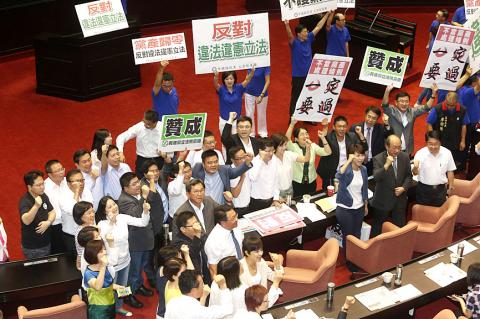The legislature yesterday passed legislation to deal with ill-gotten political party assets, which states that all properties obtained by political parties after 1945 — not including party membership fees and political donations — are to be considered illegal and must be returned to the state.
The Act Governing the Handling of Ill-gotten Properties by Political Parties and Their Affiliate Organizations (政黨及其附隨組織不當取得財產處理條例) was passed after an 11-hour review on the legislative floor in Taipei.
The act states that all assets of a political party will be considered frozen the moment the act is promulgated, with violators facing a jail term of up to five years. Any attempt to avoid, deny or obstruct investigations into party assets could lead to a fine of between NT$100,000 and NT$500,000.

Photo: CNA
The legislature also voted to approve a key provision of the act that stipulates that assets obtained since Aug. 15, 1945, would be subject to the law.
The date listed in the provision, which passed 72 to 31, was chosen because it was the day Japan officially announced its surrender to the Allies, bringing an end to World War II, as well as the day the Chinese Nationalist Party (KMT) took over properties left by the Japanese in Taiwan, Democratic Progressive Party (DPP) caucus whip Wu Ping-jui (吳秉叡) said.
The legislature held an extraordinary session aimed at pushing through the review of the draft, with several last-minute amendments made.
Earlier in the day, the KMT moved to amend the bill’s name to the “act for oversight and management of assets under political parties (政黨財產監督管理條例),” or KMT Legislator Lai Shih-bao’s (賴士葆) suggestion of the “act on handling the Chinese Nationalist Party’s assets (中國國民黨黨產處理條例).”
Lai said his suggestion was because the draft was primarily aimed at the KMT’s assets, adding that it should be named based on what it is seeking to do.
The DPP moved to amend the name of the draft from the “act on handling ill-gotten party assets” (不當黨產處理條例草案) to the approved version to include assets held by the KMT’s affiliate organizations, such as the China Youth Corps and the National Women’s League of the Republic of China, as the funding of these organizations has always been included in the party’s fiscal budget.
Presidential Office spokesman Alex Huang (黃重諺) said that President Tsai Ing-wen (蔡英文) was glad to hear the news that the act had been passed and wished to commend the entire Legislative Yuan for its hard work in preparing and passing the legislation for the benefit of nation.

CHAOS: Iranians took to the streets playing celebratory music after reports of Khamenei’s death on Saturday, while mourners also gathered in Tehran yesterday Iranian Supreme Leader Ayatollah Ali Khamenei was killed in a major attack on Iran launched by Israel and the US, throwing the future of the Islamic republic into doubt and raising the risk of regional instability. Iranian state television and the state-run IRNA news agency announced the 86-year-old’s death early yesterday. US President Donald Trump said it gave Iranians their “greatest chance” to “take back” their country. The announcements came after a joint US and Israeli aerial bombardment that targeted Iranian military and governmental sites. Trump said the “heavy and pinpoint bombing” would continue through the week or as long

TRUST: The KMT said it respected the US’ timing and considerations, and hoped it would continue to honor its commitments to helping Taiwan bolster its defenses and deterrence US President Donald Trump is delaying a multibillion-dollar arms sale to Taiwan to ensure his visit to Beijing is successful, a New York Times report said. The weapons sales package has stalled in the US Department of State, the report said, citing US officials it did not identify. The White House has told agencies not to push forward ahead of Trump’s meeting with Chinese President Xi Jinping (習近平), it said. The two last month held a phone call to discuss trade and geopolitical flashpoints ahead of the summit. Xi raised the Taiwan issue and urged the US to handle arms sales to

BIG SPENDERS: Foreign investors bought the most Taiwan equities since 2005, signaling confidence that an AI boom would continue to benefit chipmakers Taiwan Semiconductor Manufacturing Co’s (TSMC, 台積電) market capitalization swelled to US$2 trillion for the first time following a 4.25 percent rally in its American depositary receipts (ADR) overnight, putting the world’s biggest contract chipmaker sixth on the list of the world’s biggest companies by market capitalization, just behind Amazon.com Inc. The site CompaniesMarketcap.com ranked TSMC ahead of Saudi Aramco and Meta Platforms Inc. The Taiwanese company’s ADRs on Tuesday surged to US$385.75 on the New York Stock Exchange, as strong demand for artificial intelligence (AI) applications led to chip supply constraints and boost revenue growth to record-breaking levels. Each TSMC ADR represents

State-run CPC Corp, Taiwan (CPC, 台灣中油) yesterday said that it had confirmed on Saturday night with its liquefied natural gas (LNG) and crude oil suppliers that shipments are proceeding as scheduled and that domestic supplies remain unaffected. The CPC yesterday announced the gasoline and diesel prices will rise by NT$0.2 and NT$0.4 per liter, respectively, starting Monday, citing Middle East tensions and blizzards in the eastern United States. CPC also iterated it has been reducing the proportion of crude oil imports from the Middle East and diversifying its supply sources in the past few years in response to geopolitical risks, expanding